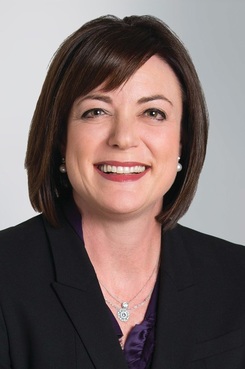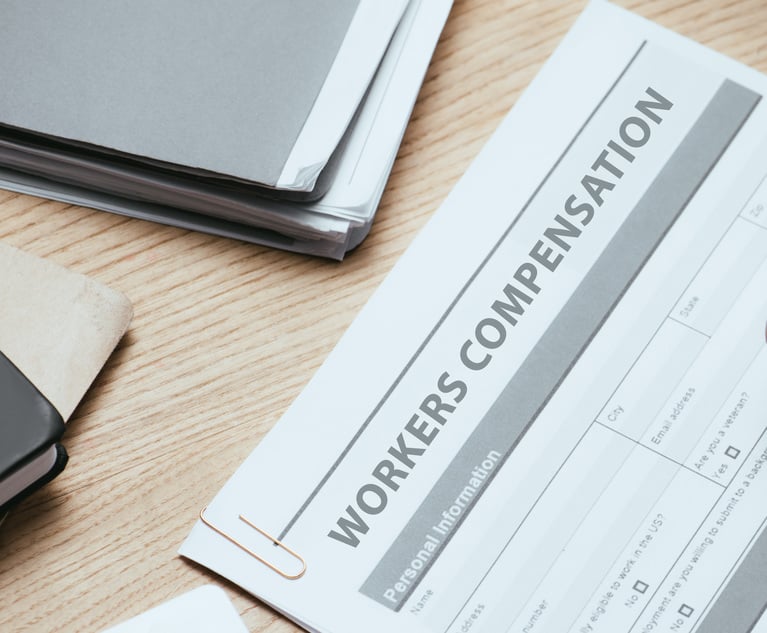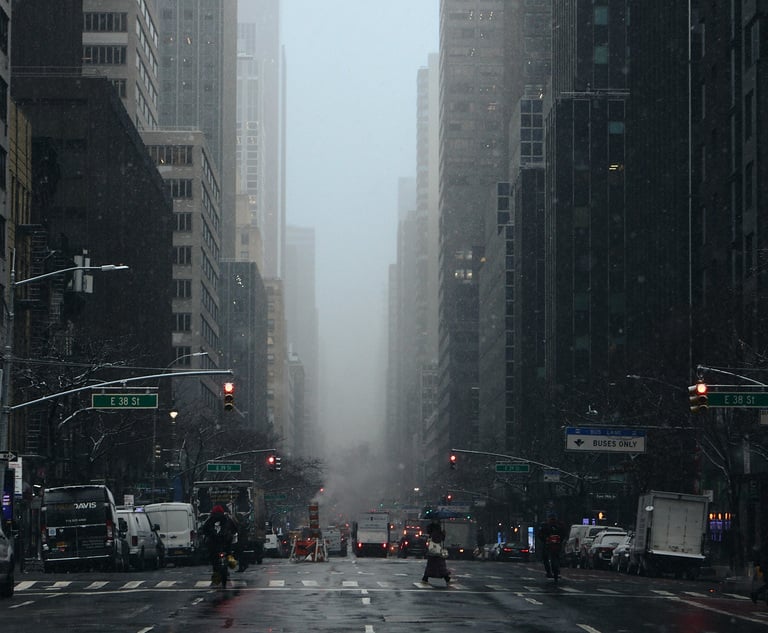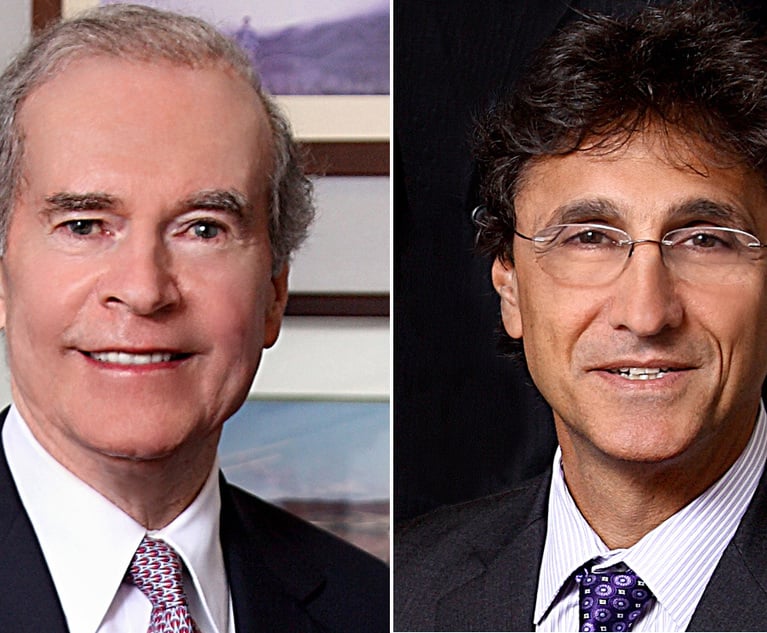The Global Impact of the #MeToo Movement (Part 2)
In the first part of this article, I discussed the current political climate and widespread social media use helped #MeToo promulgate its message and impact numerous industries throughout the United States.
July 12, 2018 at 03:07 PM
9 minute read
 Erika C. Collins, Proskauer
Erika C. Collins, Proskauer
Editor's note: This is the second part in a two-part series.
In the first part of this article, I discussed the current political climate and widespread social media use helped #MeToo promulgate its message and impact numerous industries throughout the United States.
But, due to distinct legal and cultural factors, #MeToo has taken different shape and has had varying impact across international jurisdictions. In the first article, I looked at the impact on Italy and France. This time, we'll take a look at Japan, India and Egypt.
Japan
Cultural phenomena unique to Japan created a distinctive reaction to #MeToo there. The concept of “saving face,” or avoiding embarrassment for oneself and others, is considered a high priority in Japan, see Rochelle Kopp, “Saving Face: A Little Discretion Can Go a Long Way in Japan,” Japan Intercultural Consulting (Mar. 23, 2010). This cultural value may deter women from reporting sexual harassment.
Indeed, in a May 2018 survey of over 200 large and midsize Japanese companies, only 14 percent of companies surveyed said they received complaints of sexual harassment in the past year, see “ Sexual harassment policies unchanged at most firms in Japan, despite growing awareness amid global Me Too movement: poll,” The Japan Times (May 25, 2018. A 2015 government survey found only 4 percent of rape and sexual assault victims reported to the police and more than two thirds of victims surveyed had not told a single person about the crimes.
Kurumi Mori and Shoko Oda, “#MeToo Becomes #WeToo in Victim-Blaming Japan,” Bloomberg (May 9, 2018). Japanese culture pressures people to “bear one's hardship,” see “ #MeToo Japan: What happened when women broke their silence,” BBC (Apr. 25, 2018). This deters reporting, and may help explain the culture of widespread victim-blaming.
Women's status in the workforce also may help account for underreporting. Though Japanese women participate in the workforce at a higher rate than U.S. women, their prospects for advancement are worse. Only 3.4 percent of seats on boards of the largest publicly listed companies in Japan were held by women in 2016, see “Organization for Economic Co-Operation and Development, Employment: Female share of seats on boards of the largest publicly listed companies.” Japan ranked 114th out of 144 countries in the World Economic Forum's 2017 gender gap report. Perhaps' women's low status in the workforce deters them from reporting: an April 2018 online poll of 1,000 working Japanese women found 60 percent of those who experienced sexual harassment at work “put up with it” in order to protect their status in the workplace, and only 24 percent of women surveyed reported it to work or someone else. Yet companies have not prioritized improving sexual harassment policies: in a May 2018 survey, 78 percent of companies said they had not strengthened sexual harassment policies, and 77 percent said they were not considering policy changes, “Sexual harassment policies unchanged at most firms in Japan, despite growing awareness amid global Me Too movement: poll,” The Japan Times (May 25, 2018).
To combat cultural factors unique to Japan which result in women drastically underreporting sexual harassment, #MeToo has taken a new form in Japan. In its place, #WeToo encourages unity between victims and supporters. It was created in hopes of increasing reporting as well as a feeling of validation for victims.
India
India's violent history of workplace harassment laws began in 1992. As required by her government job, Bhanwari Devi reported five upper-caste men's plan to marry off a 9-month-old girl. In response, the men gang-raped Devi. Devi reported the rape to the police, a rare act in India in 1992. Devi's experience inspired women's groups to file public interest litigation, which resulted in the first set of workplace harassment guidelines, the Vishaka Guidelines, in 1997.
India enacted more biting prohibitions on workplace sexual harassment in 2013. Another brutal and widely publicized gang-rape inspired public outrage and riots. The government responded in December 2013 with the Sexual Harassment of Women at Workplace Act. The act requires employers set up a system for reporting and addressing complaints, which may include an internal complaints committee. The committee is required to provide certain types of rectification before beginning its investigation. The act imposes strict punishments on noncompliant employers: they can be punished with a fine of up to 50,000 rupees. Repeated violations are subject to higher penalties, as well as business de-licensing or de-registration. See The Protection of Women Against Sexual Harassment at Work Place Bill (2010).
#MeToo could become a rallying movement particularly in Bollywood. In Bollywood, many female actresses find it commonplace to be asked for sexual favors in return for acting roles. See “#MeToo: Why sexual harassment is a reality in Bollywood,” BBC (Apr. 28, 2018). One anonymous actress was sexually assaulted by a casting agent. When she reported the event to the police, they told her people in the film industry can do whatever they want. Actresses that refuse sexual advances face the possibility of retaliation or being blacklisted. India's regional film industries are also slowly bringing the industry's abuse into the public eye. Sri Reddy, a “Tollywood” actress, staged a nude protest in April 2018. Videos of Reddy's protest spread over the internet and incited comments that she was merely attempting to further her career, see Jeffrey Gettleman, “ Indian Actress Stages a Topless #MeToo Protest,” The New York Times (Apr. 8, 2018). Radhika Apte, one of the few Bollywood stars to speak out about her experiences refusing producers' sexual advances, explains one barrier to Bollywood catching onto the #MeToo movement is the system of earning film roles in Bollywood. Unlike in Hollywood, where theater and acting education is heavily valued, earning roles in Bollywood is based on professional contacts, personal conduct, and appearance. Bollywood's #MeToo movement may be yet to come, given women's reluctance to report abuses.
Egypt
Sexual abuse in Egypt is also common, as indicated by a 2017 United Nations poll. The poll ranked Cairo as the most dangerous megacity for women based on factors including how well-protected women are from sexual assault., see “Exclusive—Cairo named most dangerous megacity for women; London best—poll,” Reuters (Oct. 15, 2017). Until 2014, Egyptian law did not define or criminalize sexual harassment. A 2014 law punishes sexual harassment with fines up to 5,000 Egyptian pounds and jail sentences between six months and five years. Harassers who hold a position of power over victims, including in the workplace, face longer sentences. See “ Egypt brings in new sexual harassment laws,” BBC (June 5, 2014).
One potential obstacle to #MeToo's influence in Egypt is the police. Women may feel uncomfortable reporting sexual harassment to male police officers, and there is a dearth of female officers in Egypt. See Azza Solimon, ”How #MeToo and #TimesUp Are Helping Egyptian Women Break the Silence Around Sexual Violence,” TIME (May 17, 2018), Harassment by a policeman inspired Amal Fathy to post a video detailing the harassment and discussing the government's failure to protect women. Fathy was charged with crimes including insulting Egypt. See Susannah Cullinane, “Egyptian activist detained over social media video post criticizing government,” CNN (May 11, 2018).
Perhaps in response to this issue, Egypt's Ministry of the Interior deployed female police officers to crowded areas during the Eid al-Fitr holiday specifically in order to combat sexual violence against women.
Without simplifying the issue to merely a product of religion, #MeToo has impacted Egyptian society's practice of religion. Mona Eltahawy is an Egyptian-American activist and journalist. When she was 15 years old, she journeyed to Mecca, Saudi Arabia, for an extremely holy Islamic pilgrimage called hajj. During a sacred religious moment and while in a hijab, Eltahawy was groped by a stranger. In response to a Pakistani woman's post about a similar experience at hajj, Eltahawy posted her story on Twitter using #MeToo. Her tweet inspired hundreds of posts sharing similar stories. Eltahawy then posted #MosqueMeToo to encourage more women to share their stories from the Muslim world and break the “taboo” around sexual harassment “in sacred spaces,” see Malaka Gharib, “#MosqueMeToo Gives Muslim Women A Voice About Sexual Misconduct at Mecca,” NPR (Feb. 26, 2018). Similar stories of sexual assault in the Muslim world and during holy Islamic exercises are shockingly common. See id. Many Muslim women are hesitant to report abuse because they do not want to fuel Islamophobia. Others may fear a conservative backlash that could result in men and women being separated while praying at holy sites. #MeToo may face obstacles in societies where religious factors increase women's reluctance to report abuse.
Advice to Multi-National Employers
Sexual harassment cases have arisen out of workplace conduct for decades. #MeToo has had a global impact on how these cases are perceived and addressed. Employers must be razor focused on protecting their brand and reputation, which has become increasingly challenging in the social media era. When addressing individual sexual harassment complaints and conducting investigations, it is imperative that multi-national companies understand not just the legal differences, but also the cultural nuances in the jurisdictions in which they operate.
Erika C. Collins, a partner with Proskauer, works with global companies on complex international and cross-border workplace issues, with particular expertise in navigating legal and cultural differences. Summer associate Heylee Bernstein assisted in the preparation of this article.
This content has been archived. It is available through our partners, LexisNexis® and Bloomberg Law.
To view this content, please continue to their sites.
Not a Lexis Subscriber?
Subscribe Now
Not a Bloomberg Law Subscriber?
Subscribe Now
NOT FOR REPRINT
© 2025 ALM Global, LLC, All Rights Reserved. Request academic re-use from www.copyright.com. All other uses, submit a request to [email protected]. For more information visit Asset & Logo Licensing.
You Might Like
View All

New York State Authorizes Stand-Alone Business Interruption Insurance Policies
6 minute read
Rejuvenation of a Sharp Employer Non-Compete Tool: Delaware Supreme Court Reinvigorates the Employee Choice Doctrine
8 minute read
Trending Stories
- 1ACC CLO Survey Waves Warning Flags for Boards
- 2States Accuse Trump of Thwarting Court's Funding Restoration Order
- 3Microsoft Becomes Latest Tech Company to Face Claims of Stealing Marketing Commissions From Influencers
- 4Coral Gables Attorney Busted for Stalking Lawyer
- 5Trump's DOJ Delays Releasing Jan. 6 FBI Agents List Under Consent Order
Who Got The Work
J. Brugh Lower of Gibbons has entered an appearance for industrial equipment supplier Devco Corporation in a pending trademark infringement lawsuit. The suit, accusing the defendant of selling knock-off Graco products, was filed Dec. 18 in New Jersey District Court by Rivkin Radler on behalf of Graco Inc. and Graco Minnesota. The case, assigned to U.S. District Judge Zahid N. Quraishi, is 3:24-cv-11294, Graco Inc. et al v. Devco Corporation.
Who Got The Work
Rebecca Maller-Stein and Kent A. Yalowitz of Arnold & Porter Kaye Scholer have entered their appearances for Hanaco Venture Capital and its executives, Lior Prosor and David Frankel, in a pending securities lawsuit. The action, filed on Dec. 24 in New York Southern District Court by Zell, Aron & Co. on behalf of Goldeneye Advisors, accuses the defendants of negligently and fraudulently managing the plaintiff's $1 million investment. The case, assigned to U.S. District Judge Vernon S. Broderick, is 1:24-cv-09918, Goldeneye Advisors, LLC v. Hanaco Venture Capital, Ltd. et al.
Who Got The Work
Attorneys from A&O Shearman has stepped in as defense counsel for Toronto-Dominion Bank and other defendants in a pending securities class action. The suit, filed Dec. 11 in New York Southern District Court by Bleichmar Fonti & Auld, accuses the defendants of concealing the bank's 'pervasive' deficiencies in regards to its compliance with the Bank Secrecy Act and the quality of its anti-money laundering controls. The case, assigned to U.S. District Judge Arun Subramanian, is 1:24-cv-09445, Gonzalez v. The Toronto-Dominion Bank et al.
Who Got The Work
Crown Castle International, a Pennsylvania company providing shared communications infrastructure, has turned to Luke D. Wolf of Gordon Rees Scully Mansukhani to fend off a pending breach-of-contract lawsuit. The court action, filed Nov. 25 in Michigan Eastern District Court by Hooper Hathaway PC on behalf of The Town Residences LLC, accuses Crown Castle of failing to transfer approximately $30,000 in utility payments from T-Mobile in breach of a roof-top lease and assignment agreement. The case, assigned to U.S. District Judge Susan K. Declercq, is 2:24-cv-13131, The Town Residences LLC v. T-Mobile US, Inc. et al.
Who Got The Work
Wilfred P. Coronato and Daniel M. Schwartz of McCarter & English have stepped in as defense counsel to Electrolux Home Products Inc. in a pending product liability lawsuit. The court action, filed Nov. 26 in New York Eastern District Court by Poulos Lopiccolo PC and Nagel Rice LLP on behalf of David Stern, alleges that the defendant's refrigerators’ drawers and shelving repeatedly break and fall apart within months after purchase. The case, assigned to U.S. District Judge Joan M. Azrack, is 2:24-cv-08204, Stern v. Electrolux Home Products, Inc.
Featured Firms
Law Offices of Gary Martin Hays & Associates, P.C.
(470) 294-1674
Law Offices of Mark E. Salomone
(857) 444-6468
Smith & Hassler
(713) 739-1250






